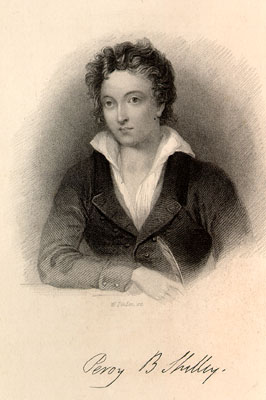I met a traveller from an antique land
Who said: "Two vast and trunkless legs of stone
Stand in the desert. Near them on the sand,
Half sunk, a shattered visage lies, whose frown
And wrinkled lip and sneer of cold command
Tell that its sculptor well those passions read
Which yet survive, stamped on these lifeless things,
The hand that mocked them and the heart that fed.
And on the pedestal these words appear:
'My name is Ozymandias, King of Kings:
Look on my works, ye mighty, and despair!'
Nothing beside remains. Round the decay
Of that colossal wreck, boundless and bare,
The lone and level sands stretch far away".
I know, I know . . . that's a lot more than two or three lines. But which lines would you have me cut? There's no fat in this poem -- it's all muscle.
Shelley wrote this poem in 1817, when he was 25 years old. He drowned while sailing off the west coast of Italy in 1822, a month before his 30th birthday.
"Ozymandias" (pronounced with four syllables to fit the meter of the poem) is a Greek name for Ramesses II (who is also known as "Ramesses the Great"), the most celebrated of all Egyptian pharaohs.
Shelley's poem reminds us of a truth that is bitter to many, but impossible to refute. No matter how monumental the accomplishments of a man may be, there will come a time when his works will decay into a "colossal wreck," leaving those who come later to observe (as did Shelley): "Nothing beside remains."
Or, to put it another way, Vanitas vanitatum, omnia vanitas.
 |
| Percy Bysshe Shelley |






















